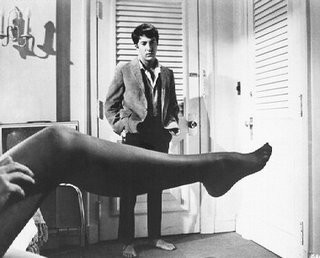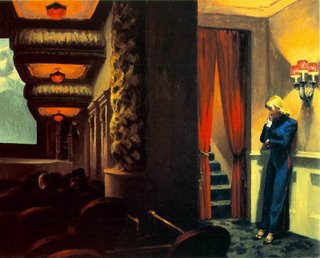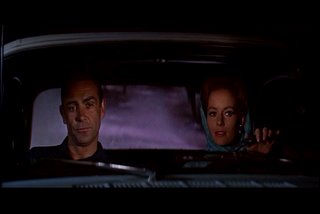
Hehehe... This'll be fun.
Say “hello” to the Unknown Screenwriter, a guy who, like me, must keep his identity a mystery or… he’ll have to kill you. Unk’s a smart fox and his blog is great fun.
I have said before that seduction is really about the fine art of subtext. A guy should never walk up to a woman and say what he’s really thinking: “You’re hot. I’m horny. Let’s have sex.” She wants to connect with you first… And here we have from Body Heat, which was written by the great Lawrence Kasdan, Racine’s attempt to seduce Matty, which was, frankly, not much better than the Begging Horny Dog Approach of the Average Frustrated Chump.
But WAIT, there’s a bonus! Like that scene in Annie Hall, Unk gives us the subtext of every single line, and it’s HYSTERICAL. (His notes are in blue after each line.) You will also realize that Racine’s bad approach was essential to the story.
Here are Unk’s thoughts…
Of course, anyone could interpret the subtext differently and still have a similar meaning... The subtext in the notes I made is in the context of the scene itself. We know, after having watched BODY HEAT that Matty had premeditated the entire plan to put Racine in the hot seat after her fake death from the boat house being blown up.
So when you look at the scene with that perspective, the subtext becomes amazing because to me, Matty is totally sizing up Racine in this scene to see if he really will think with the other head.
Enjoy...
Unk
EXT. THE BEACHFRONT - NIGHT
The hottest January in fifty years has brought the crowds to the beach in search of relief. But they've been disappointed. Even the breeze off the ocean seems blown from a hair dryer. Still, the nights are a trifle better and the Beachfront, the penny arcades, the ice cream stands and bars are busy, even now in the middle of the week.
Racine comes out of a bar and lights a cigarette, idly watching the passing parade. There is a free band concert in progress at the band shell. Racine wanders in that direction.
EXT. THE BAND SHELL - NIGHT
The Miranda Beach High School Orchestra is playing to a full, sweating house; the audience is a sea of orange programs fluttering away as fans. People come and go
frequently.
The atmosphere is as innocent and informal as the music the band is playing now.
Racine leans against the back rail, smoking, his eyes playing over the scene with no expectations.
Then, down near the center aisle, a WOMAN rises. As the band plays on, this extraordinary, beautiful woman, in a simple white dress, moves down the aisle. She moves wonderfully. The dress clings to her body in the heat.
Racine watches, mesmerized, as she walks directly toward him. She passes within a few inches of him, her eyes lowered. Racine's body sways a moment as she goes by, as though buffeted by some force. But they do not touch. She goes out onto the Beachfront walkway.
EXT. THE BEACHFRONT WALKWAY - NIGHT
The Woman, MATTY, has walked to the rail. She stands there now lighting a cigarette.
She presents her face to the ocean, hoping for a breeze. We move in on her, with Racine.
Racine lights a new cigarette and smiles at her. She looks at him and, for an instant, her eyes race over his body, then she looks back at the ocean.
RACINE
You can stand here with me if
you want, but you'll have to
agree not to talk about the heat.
[I’ve noticed you. You are gorgeous and I want to get to know you better. Actually, I’m horny, and I want to do you.]
She looks at him, and there is something startling about the directness of her gaze. When she speaks, she is cool without being hostile.
MATTY
I'm a married woman.
[I’m married. Are you still interested?]
RACINE
Meaning what?
[Hell, yes, I’m still interested as long as you’re willing.]
MATTY
Meaning I'm not looking for company.
She turns back toward the ocean.
[I might be interested as long as there are no strings.]
RACINE
Then you should have said --
'I'm a HAPPILY married woman.'
[I kind of thought you might be interested. You look a little horny.]
MATTY
That's my business.
[So what if I’m horny?]
RACINE
What?
[So you ARE a little horny… I knew it!]
MATTY
How happy I am.
[Please, it really doesn’t concern you.]
RACINE
And how, happy is that?
[It does concern me right here right now. I’m horny… You’re horny. Let’s be horny together!]
She looks at him curiously. She begins walking slowly along the rail. He walks too.
MATTY
You're not too smart, are you?
[Maybe I don’t want to be horny with you.]
Racine shakes his head "no."
MATTY
I like that in a man.
[I like guys that are less intelligent than myself. *Note: This little bit of dialogue takes on a whole new meaning by the end of the film when Matty is sitting on an island sipping a drink… Of course we do not know this yet… LOL. She’s basically saying out loud to herself, “Wow, I finally found my perfect pigeon for my premeditated plan to have you kill my husband so I can inherit ALL of his money.”]
RACINE
What else you like -- Ugly?
Lazy? Horny? I got 'em all.
[I will do ANYTHING or be ANYBODY if you will let me have sex with you.]
MATTY
You don't look lazy.
[I can see that you are horny and ugly.]
Racine smiles.
MATTY
Tell me, does chat like that
work with most women?
[That is about the most stupid pick-up line I have ever heard.]
RACINE
Some. If they haven't been
around much.
[It works on the locals around here.]
MATTY
I wondered. Thought maybe I was
out of touch.
[Well, buddy, I am not one of your usual little local bimbos.]
She stops again at the rail as a small breeze blows in from the ocean. She turns her back to it and, with her cigarette dangling from her lips, she uses both hands to lift her hair up off her nape. She closes her eyes as the air hits her. Racine watches very closely.
RACINE
How 'bout I buy you a drink?
[Can we please be horny with each other?]
MATTY
I told you. I've got a husband.
[You’re going to have to do better than that to get horny with me. Try harder.]
RACINE
I'll buy him one too.
[I don’t care if you are married. I like you. You are attractive and maybe, just maybe, if I can step sell you to have a drink with me, we will eventually have sex! By the way, is your husband around here some where?]
MATTY
He's out of town.
[I’m all alone and maybe just a little horny but still, you haven’t convinced me that we should be horny together.]
RACINE
My favorite kind. We'll drink
to him.
[I really like the fact that he’s not available now. Now you and I can get to know each other a little bit better without him putting a damper on my plan to have sex with you!]
MATTY
He only comes up on the weekends.
[Hmmm. You know, I am kind of horny and hell, the old guy is never around anyway except on the weekends. I’m getting kind of used to you now anyway. Maybe we should HOOK UP! *Note: Of course, this is Matty’s way of letting Racine know she’s interested now… Part of her master plan to frame him later on.]
Matty lets her hair fall and again begins moving down walkway. She drops her cigarette and steps on it.
RACINE
I'm liking him better all the
time.You better take me up on this
quick. In another forty-five
minutes I'm going to give up and
walk away.
[Now you’re talking! My step selling plan to bed you tonight is starting to work! But no matter what happens NOW, I am not giving up here. No way – no how!]
MATTY
You want to buy me something?
I'll take one of these.
[I’m so hot right now… Hot from the heat AND all of your pick-up lines. Buy me a snow cone and cool me off! *Note: Of course, this is also part of Matty’s plan. She’s using herself as a piece of meat to entice the DOG inside Racine.]
They have come upon a Vendor selling snow cones.
RACINE
What kind?
[I will buy ANYTHING you want… Especially if it helps me get into your pants later tonight.]
MATTY
Cherry.
[Visualize me sucking on a cherry…]
RACINE
(to Vendor)
Make it two.
[No problem. I’ll get two just in case! I love CHERRY!]
The Vendor scoops and pours as Racine lays some change on the cart.
RACINE
(to Matty)
You're not staying in Miranda
Beach.
(she shakes her head
"no")
I would have noticed you.
[You don’t hang with us locals down here in the slums, do you? Besides, I would have definitely seen you before if you had because I am always on the lookout for hot, rich women like yourself.]
MATTY
Is this town that small?
[Boy, you must really get around. Either that or your full of shit.]
Racine hands her a snow cone. They walk over to the rail. Racine watches her eat the snow cone with enormous interest.
RACINE
Pinehaven. You're staying up in
Pinehaven, on the waterway.
(she gives him a look,
surprised)
You have a house.
[Here’s how smart I am. I can tell by the way you act, the way you dress, the way you talk, etc, that you must be well off. I LIKE THAT!]
MATTY
How'd you know?
[A gorgeous woman like me has her standards, ya know.]
RACINE
You look like Pinehaven.
[Well, even though I mostly tackle the local fare, I’ve always dreamed of taking down a big score like yourself. How am I doing so far?]
MATTY
How does Pinehaven look?
[I think you’re full of shit but okay, tell me more about how I look to you.]
RACINE
Well tended.
[You look exactly how I said you look. I’m right and you know it.]
She looks out at the ocean.
MATTY
Yes, I'm well tended, all right.
Well tended. What about you?
[Yeah, okay… So you’re right about me. Any idiot could have figured that out. Tell me something about yourself.]
RACINE
Me? I need tending. I need
someone to take care of me. Rub
my tired muscles. Smooth out my
sheets.
[I’m a local sheister… A little down on his luck. I could use a big score like you. I’d never have to work again. Interested?]
MATTY
Get married.
[Nope, I’m not interested.]
RACINE
I just need it for tonight.
[Come on. Your husband isn’t home. I’m horny. I think you’re horny. Let’s just DO IT!]
For the first time, Matty laughs. A moment later, she spills the snow cone over the front of her dress. It makes a bright red stain against the white. The thin material clings to the line of her breast.
MATTY
Good. Nice move, Matty.
[I am such a klutz… Oh, and by the way… My name is Matty.]
RACINE
Matty. I like it. Right over
your heart.
[Thanks for telling me your name. It’s a nice name. That spot is right over your breast. I would love to see that breast.]
MATTY
At least it's cool. I'm burning
up.
[You don’t care what my name is. You just want to do me. It’s written all over your face.]
RACINE
I asked you not to talk about
the heat.
[I know, I know. I’m so transparent. Please don’t remind me.]
MATTY
Would you get me a paper towel
or something? Dip it in some
cold water.
[Hmmm. I’m actually hatching a plan to murder my husband and I sure need somebody stupid and transparent. Someone like YOU. I guess as long as you end up doing my bidding, we can start doing it. After all, the payoff is huge and I’m not going to share it with you. So could you please get me a paper towel?]
Racine starts toward the restroom nearby.
RACINE
Right away. I'll even wipe it
off for you.
[Are you kidding? I’m so horny to have sex with you right now that I don’t care what kind of plan you’re hatching up! All I know is that I wanna bang you. I’ll get the paper towel and after I get it, I will do ANYTHING you want me to do.]
MATTY
You don't want to lick it?
[You’re hired!]
This causes a momentary hitch in Racine's retreat, but then he hurries off.





























